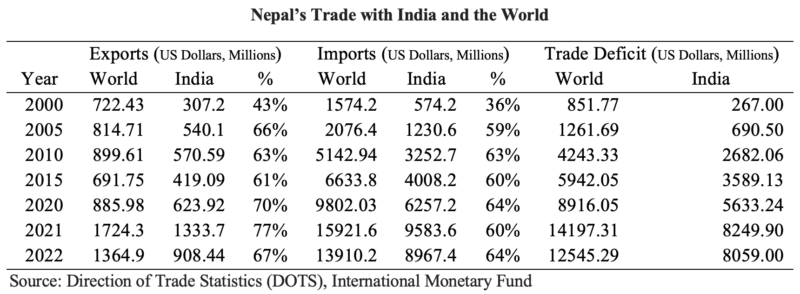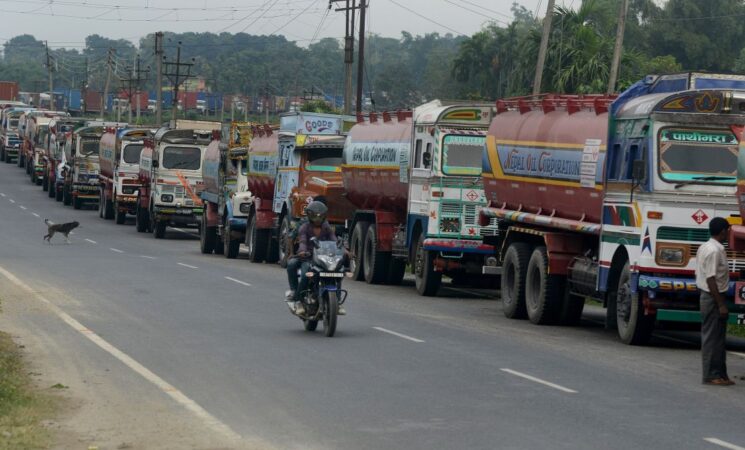11 December 2023, NIICE Commentary 8846
Sunil Kumar Chaudhary
The economic relations between India and Nepal are significant and multifaceted, driven by their geographical proximity and historical, cultural, and economic ties. India and Nepal, two neighbouring countries in South Asia, share a unique and complex economic relationship that has evolved significantly over the years. Nepal’s geographical configuration lacks natural barriers along its borders with India, resulting in traditionally open and accessible boundaries.
Economic ties between India and Nepal have long-standing historical roots. The 1950 Indo-Nepal Treaty of Peace and Friendship and Treaty of Trade and Transit signed in 1960 and other bilateral agreements have played a significant role in enhancing trade and institutionalising a prominent aspect of economic relations. India entered into peace and trade agreements with Nepal, driven by shared interests, thereby granting landlocked Nepal unrestricted access to global markets for its exports.
Both nations are participants in regional entities such as the South Asian Association for Regional Cooperation (SAARC) and the Bay of Bengal Initiative for Multi-Sectoral Technical and Economic Cooperation (BIMSTEC). These organisations actively foster economic integration and collaboration within South Asia and the broader regional context.
India and Nepal’s economic relations are an integral part of their overall bilateral relationship, which encompasses not only economic aspects but also cultural, political, and social ties. While there may be occasional challenges, both countries have a mutual interest in enhancing their economic cooperation, fostering regional stability, and promoting economic development in the region.
Trade Relations
The two nations have an open border, and trade is regulated by a bilateral trade treaty. The Nepal-India Treaty of Transit (1999), Treaty of Trade (2009), the Agreement of Cooperation to Control Unauthorised Trade (2009), and the Rail Services Agreement (2004) jointly lay the foundation for a bilateral framework governing trade and transit between the two countries.
Under the Treaty of Trade (2009), Nepali-manufactured goods enjoy duty-free access to the Indian market on a non-reciprocal basis. The Agreement for Cooperation between India and Nepal to Control Unauthorised Trade, signed in 2009, provides the legal framework for combating illegal trade. The India-Nepal Treaty of Transit, renewed every seven years, grants port facilities to Nepal at Kolkata/Haldia and Visakhapatnam, specifying various transit routes between Kolkata and Visakhapatnam and the India-Nepal border. For bilateral trade, 27 entry/exit points are designated along the Indo-Nepal border.
The Rail Services Agreement of 2004 delineates the operational and managerial specifics of rail services between India and Nepal. Initially, the connection was established from Kolkata/Haldia port to the Raxaul/Birgunj transit point in Nepal. In 2016, Visakhapatnam Port was incorporated as an additional designated point for Nepal-bound transit trade, expanding the reach of the rail service to include the port. On 9 July 2021, a Letter of Exchange (LoE) was officially signed for the Rail Service Agreement (RSA) between Nepal and India. This agreement opens avenues for all cargo train operators to utilise the extensive Indian railway network for transporting containers to and from Nepal. This includes facilitating bilateral freight between India and Nepal, as well as accommodating third-country freight from Indian ports to Nepal. The implementation of this arrangement is anticipated to improve efficiency and cost-competitiveness, ultimately bringing benefits to consumers in Nepal.
These treaties allow for the smooth exchange of goods and services between the two nations. Nepal primarily exports goods like carpets, textiles, tea, and handicrafts to India, while it imports a wide range of products including petroleum products, machinery, electronics, pharmaceuticals, and agricultural products. Nepal’s most significant trading partner is India, and the open border shared between the two nations serves as a facilitator for seamless trade and commerce.
Investment and Development Projects
 Indian investment has played a crucial role in Nepal’s economic development and infrastructure projects. India has been a significant source of foreign direct investment (FDI) in Nepal. Indian companies have invested in various sectors, including hydropower, manufacturing, and infrastructure development, telecommunications, banking. These investments have contributed to Nepal’s economic growth and development. Several leading Indian companies are actively conducting business in Nepal, including ITC, Dabur, Hindustan Unilever, VSNL, TCIL, MTNL, State Bank of India, Life Insurance Corporation of India, Asian Paints, Tata Projects, and GMR India, among others. India has played a crucial role in infrastructure development projects in Nepal, such as road and railway construction and hydropower generation. India provides economic and development assistance to Nepal through various projects, grants, and concessional loans. This assistance is aimed at supporting Nepal’s economic growth, infrastructure development, and social sectors like education, healthcare, and rural development.
Indian investment has played a crucial role in Nepal’s economic development and infrastructure projects. India has been a significant source of foreign direct investment (FDI) in Nepal. Indian companies have invested in various sectors, including hydropower, manufacturing, and infrastructure development, telecommunications, banking. These investments have contributed to Nepal’s economic growth and development. Several leading Indian companies are actively conducting business in Nepal, including ITC, Dabur, Hindustan Unilever, VSNL, TCIL, MTNL, State Bank of India, Life Insurance Corporation of India, Asian Paints, Tata Projects, and GMR India, among others. India has played a crucial role in infrastructure development projects in Nepal, such as road and railway construction and hydropower generation. India provides economic and development assistance to Nepal through various projects, grants, and concessional loans. This assistance is aimed at supporting Nepal’s economic growth, infrastructure development, and social sectors like education, healthcare, and rural development.In recent years, there have been notable changes in India-Nepal economic relations. For instance, infrastructure development projects, such as roadways and railways, have been initiated to enhance connectivity between the two countries. These projects aim to facilitate smoother trade and movement of people.
Additionally, both countries have shown a growing interest in energy cooperation, particularly in the hydropower sector. The energy sector presents significant opportunities for cooperation. Cross-border energy trade and hydropower projects have the potential to redefine the economic landscape. Joint ventures and partnerships in the energy sector are steps toward achieving mutual energy security and sustainability. Hydropower is a significant area of economic cooperation. Indian companies have been involved in developing hydropower projects in Nepal, which aims to harness its vast hydropower potential and meet its energy demands.
India and Nepal collaborate on various economic cooperation initiatives, including cross-border trade, transit, and the development of special economic zones. These initiatives aim to promote economic growth and development in both countries. Economic cooperation and interdependence between India and Nepal continue to be vital aspects of their bilateral relationship. While there have been occasional challenges and disputes, both countries recognize the mutual benefits of close economic ties and cooperation, which contribute to the overall development and stability of the region.
Challenges and Prospects
While the economic relations between India and Nepal have seen positive developments, they are not without challenges. Trade imbalances, bureaucratic hurdles, and disputes over water resources are some of the challenges that need to be addressed for a more robust economic partnership. Nepal and India need to improve the efficiency of cross-border trade. Furthermore, water resource management and disputes over shared rivers remain complex issues.
Opportunities for collaboration exist in various sectors, such as tourism, education, and technology. People-to-people ties, cultural exchanges, and mutual investments hold the potential to foster deeper economic relations. On the positive side, there are numerous prospects for collaboration in education, tourism, technology, and culture. Enhanced people-to-people ties, cultural exchanges, and bilateral investments hold the potential to deepen economic relations and foster sustainable development.
Despite their close economic ties, India and Nepal have faced trade disputes and tensions at times. These disputes have included issues related to non-tariff barriers, and trade restrictions. Resolving these issues is an ongoing challenge in their economic relationship.
Conclusion
India and Nepal share a multifaceted economic relationship that continues to evolve. While challenges persist, both countries have a vested interest in further enhancing their economic ties. The recent focus on infrastructure development and energy cooperation signifies a positive shift in the relationship. With a mutual commitment to address challenges and explore opportunities, the future of India-Nepal economic relations appears promising. This evolving partnership serves as a testament to the enduring bonds between these neighbouring nations.
Sunil Kumar Chaudhary is a Visiting Fellow at NIICE. This article is from the Special Report on Nepal-India Relations jointly produced by NatStrat and NIICE. Please Click Here for Full Report.

